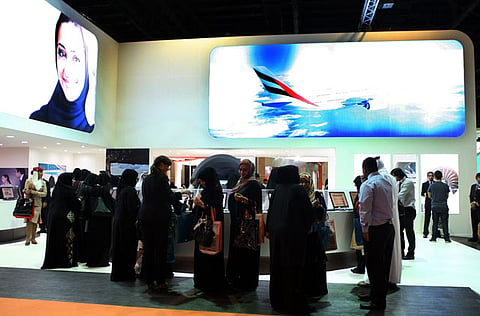UAE closing narrow gender gap
World Economic Forum report ranks country top in Mena region

Geneva: The UAE leads the Middle East and North Africa in having the narrowest gender gap thanks to its approach to adequately capitalise on investments in education and success in health, education, political and economic participation, according to the Global Gender Gap Report 2013, published on Friday by the Geneva-based World Economic Forum.
The UAE scored 109th overall in the countries list after receiving strong ratings in gender equality in education attainment as the report measures ratios of female literacy rate over male value, female net primary enrolment rate over male value, female net secondary enrolment rate over male value and female gross tertiary enrolment ratio over male value.
“The highest placed country in the Middle East and North Africa [Mena] is the UAE which has achieved parity in education,” the report noted.
“Nevertheless most countries in the region, including Bahrain (112th), Qatar (115th) and others are still failing to adequately capitalise on the investments in education through greater economic and political contributions from women.”
The world’s gender gaps narrowed slightly in 2013 on the back of definite, if not universal, improvements in economic equality and political participation between the sexes, according to the report.
Closing the gender gap
The eighth annual edition of the report ranks 136 countries on their ability to close the gender gap in four key areas: economic participation and opportunity, political empowerment, health and survival, educational attainment, political participation and economic equality.
Of the 133 countries that were measured in both 2012 and 2013, 86 actually improved their gender gap during this time.
Overall, the report finds Iceland the most advanced country in the world in terms of gender equality for the fifth year running. It, along with Finland (2nd), Norway (3rd) and Sweden (4th), has now closed over 80 per cent of its gender gap. These countries are joined in the top 10 by the Philippines, which enters the top five for the first time, Ireland (6th), New Zealand (7th), Denmark (8th), Switzerland (9th) and Nicaragua (10th).
Elsewhere, in 14th place Germany is the highest-placed individual G20 economy, although it falls one place from 2012. Next is South Africa (17th, down one), the United Kingdom (level on 18th) and Canada (up one to 20th). The US comes 23rd, also down one place since 2012.
At the global level, the report finds that in 2013, 96 per cent of the health and survival gender gap has been closed. It is the only one of the four pillars that has widened since 2006.
In terms of education, the global gender gap stands at 93 per cent, with 25 countries having closed their gaps completely. The gender gaps for economic equality and political participation are only 60 per cent and 21 per cent closed respectively, although progress is being made in these areas, with political participation narrowing by almost two per cent last year.



